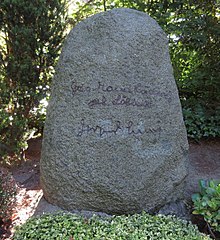Gerhard Ludwig
Gerhard Ludwig (born June 27, 1909 in Berlin ; † April 19, 1994 in Cologne ) was a German entrepreneur. In June 1946 he received a license to sell press in Cologne Central Station from the British military administration and in December 1949 opened the first bookstore on the German Federal Railroad.
Cologne Wednesday talks
This created one of the best-known German train station bookstores , which with the Wednesday talks in the 1950s became the scene of the first German talk show and thus made Ludwig known nationwide.
Since December 6, 1950, at the suggestion of the writer Jakob Kneip , Gerhard Ludwig organized his political and cultural Wednesday talks, which had become an authority, in the so-called “Third Waiting Room” - the station bookshop . Under the motto “Free entry, free questions, free answers”, Ludwig also invited guests to his bookstore under the title “The green carpet” . Prominent guests from all over the republic gave lectures or read from their latest publications. The topics of these public discussions, which were initially intended as advertising , met with a great response from the public and the media. The participants in the sometimes heated debates included, for example, Heinrich Böll , Joseph Beuys , Erich Mende , Ludwig Erhard , Werner Finck , Peter Bamm , Bernhard Grzimek , Peter Lorre , Gottfried Benn , Theodor W. Adorno , Rudolf Augstein , Gustaf Gründgens , Caterina Valente , Heinz Rühmann , Horst Buchholz or Ernst von Salomon . It was about controversial topics such as "Freedom of the press" (May 21, 1952), "The Rowohlt publishing house and its authors" (October 7, 1953), "rearmament" (November 3, 1954) or "death penalty yes or no?" (March 16, 1955). On July 4, 1956, the Wednesday talks were ended after 260 episodes due to renovations. Carlo Schmid wrote a farewell greeting in the guest book. Sometimes over 800 spectators came to the disputes. On September 23, 1957, the renovation was completed and the new station hall was inaugurated. In 1990 WDR broadcast excerpts from the tape recordings of Gerhard Ludwig on the radio program.
140 copies of various tape recordings are in the House of the History of the Federal Republic of Germany in Bonn. Anyone can listen to it there.
pocketbooks
On July 25, 1957, Ludwig opened Germany's first paperback shop in Cologne's main train station , putting an idea he had developed with the publisher Heinrich Maria Ledig-Rowohlt and the Kassel train station book dealer Vaternahm into practice: “ World literature at an affordable price to make it accessible to a wide audience. ”It was also the first self-service shop in the German book trade.
The Stuttgart train station bookseller Adam-Claus Eckert acquired the Cologne bookstore in 1988 and expanded it into a brand. It is now part of the Stuttgart- based Dr. Eckert , which is represented with books and magazines at a total of ten major train stations in Germany. In 2016 it became known that the federal police station , which is ten meters further, would be enlarged and move to the bookstore's premises.
Others
Fritz Singer dealt with the fate of Gerhard Ludwig during the Second World War in his book "Hidden Threads". Gerhard Ludwig was sentenced to death for a nullity, which he was accused of " undermining military strength ". The sentence was later commuted to a time sentence. So he survived the Nazi era, even if only barely.
Gerhard Ludwig was acquainted with the writer Herbert Rittlinger . In the list of Wednesday talks at the 155th event on November 11, 1953, the following was noted: Herbert Rittlinger “The civilized and the adventure” . On Rittlinger's trip to Africa in 1954, Ludwig flew to Addis Ababa with tent and folding boat equipment and took part in folding boat trips on Lake Tana for a few weeks. From the beginning of December 1953 to March 1954 he had therefore skipped his Wednesday talks. In his book Black Adventure, Rittlinger describes the weeks together with the "most famous station book dealer in Germany".
In 1954 he married Gesa-Maria Löbbecke (1927–1968) in Hanover . Gerhard Ludwig died in 1994 at the age of 84 and was buried in his wife's grave at the Junkersdorf cemetery in Cologne (hall 6 no. 13/14).
literature
- Dörstel, Wilfried., Historical Archive (Cologne): The Cologne Wednesday Talks : 1950–1956; free entry, free questions, free answers . Histor. Archive, Cologne 1991, ISBN 3-87519-126-9 .
Web links
Individual evidence
- ^ Excerpt from: Neue Deutsche Wochenschau 269/1955 - Films of the Federal Archives. Retrieved May 1, 2018 .
- ^ Peter Fuchs, Chronicle of the History of the City of Cologne , Volume 2, 1991, p. 295
- ↑ ChronikNet, entry for July 25, 1957
- ↑ Richard Deiss, Department Store of Words: 222 Bookstores You Should Know , 2012, p. 105
- ^ Death certificate No. 14 from January 2, 1969, registry office Cologne-East. In: LAV NRW R civil status register. Retrieved May 8, 2020 .
| personal data | |
|---|---|
| SURNAME | Ludwig, Gerhard |
| BRIEF DESCRIPTION | German entrepreneur |
| DATE OF BIRTH | June 27, 1909 |
| PLACE OF BIRTH | Berlin |
| DATE OF DEATH | April 19, 1994 |
| Place of death | Cologne |
